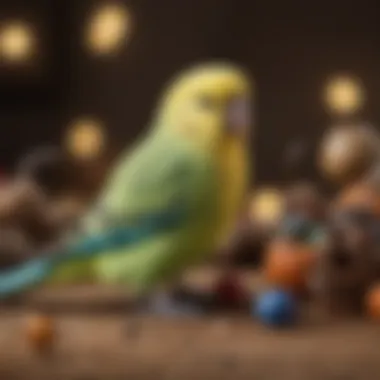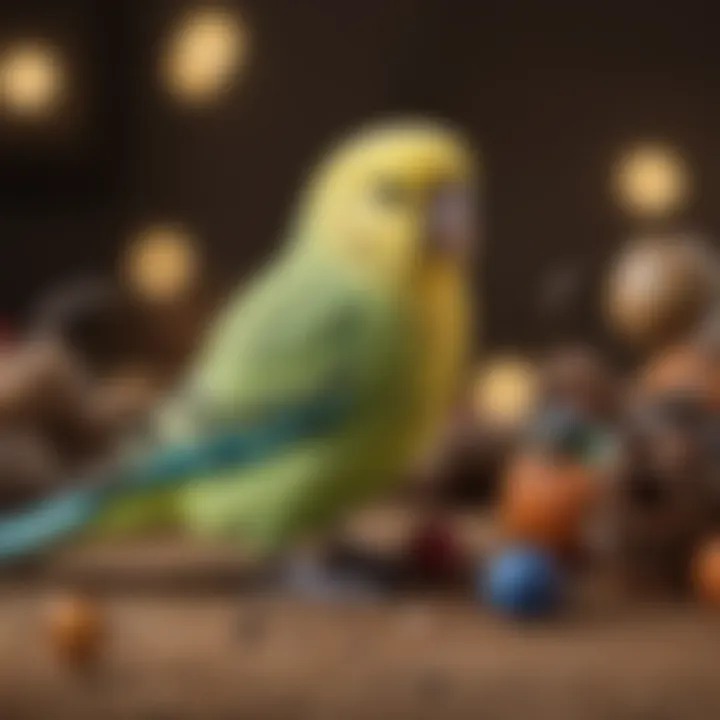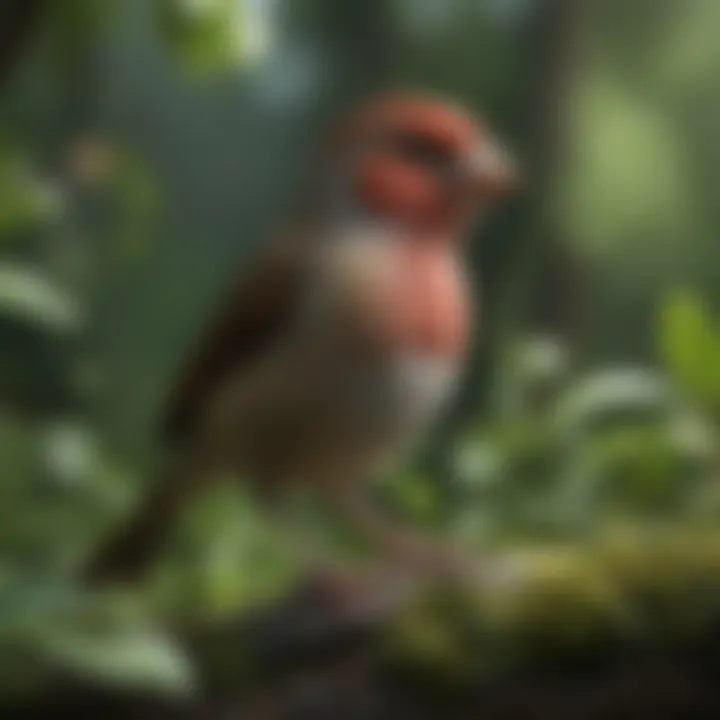Selecting the Best Pet Bird for Your Lifestyle


Intro
Choosing a pet bird is not merely about selecting a creature with feathers and a beak; it’s about understanding the rich tapestry of avian life and how it intertwines with our own. Birds can be delightful companions, capable of bringing joy and vibrancy to a home, yet they require diligent care and thoughtful interaction. In this guide, we will delve into the nitty-gritty of selecting the perfect feathered friend, ensuring that every choice you make aligns with your lifestyle and aspirations.
From species characteristics to dietary needs, housing setups to bond-building techniques, this comprehensively structured framework serves to illuminate and elevate your journey into bird ownership. We’ll navigate through the essentials, highlighting the responsibilities that come with caring for these extraordinary beings, while also addressing their training, health, and the emotional connection they can foster with their human caregivers. So, whether you're a seasoned bird aficionado or an enthusiastic beginner, get ready to enrich both your life and the life of your impending avian companion.
Understanding Avian Species
Choosing the right pet bird involves more than just picking a pretty face or a colorful feather. It's about understanding the vast world of avian species that inhabit our planet and how one might fit into your life. A firm grasp of the different characteristics and needs of birds will allow prospective owners to select a pet that complements their lifestyle and environment effectively.
Understanding avian species is crucial as it sets the groundwork for everything else in this guide. The focus should be on specific aspects such as the natural behaviors, social needs, and even life expectancy of these creatures. By delving into the rich diversity of birds, caregivers can make informed choices that prevent frustration and help foster a nurturing environment. Owning a bird isn’t just a hobby; it’s a commitment that affects both the bird and the owner.
Diversity of Bird Species
Birds are incredibly diverse, boasting thousands of species scattered across the globe, each with distinct traits, temperaments, and care requirements. This diversity means you can find an avian companion that suits your individual preferences and capacities. For example, some species are renowned for their vocal abilities, like parrots, while others might be cherished for their vibrant plumage, such as finches and canaries.
When considering the diversity of species, it’s helpful to keep these aspects in mind:
- Behavioral traits: Different birds display various social behaviors, from the more solitary canaries to the social African Greys.
- Lifespan: This varies significantly, with some smaller birds living for 5-15 years while larger parrots can live for several decades.
- Care needs: The level of interaction they require can differ dramatically, influencing your daily routine.
Selecting Based on Size and Lifespan
When picking your feathered friend, size and lifespan are fundamental factors to consider. Smaller birds like budgies and finches typically require less space and can be easier to care for, making them ideal for first-time bird owners or those with limited living arrangements. On the other hand, larger species, such as cockatoos and parrots, demand more space in their environment, along with a longer commitment of time and resources.
- Small Birds: Generally more budget-friendly, these birds can be great for individuals who prefer low-maintenance companions. However, they may have shorter lifespans, so it's wise to prepare for that in advance.
- Large Birds: While they can be more demanding, larger birds often form strong bonds with their owners and can be more interactive.
In terms of lifespan, consider how much of your life you’re willing to share with your pet bird. Is it a few years or a lifelong companion? Understanding these factors will play a pivotal role in ensuring a fulfilling bird ownership experience.
Common Pet Bird Types
When it comes to pet birds, a few types stand out due to their popularity, traits, and unique care requirements. Understanding these often-chosen birds can help narrow down your options effectively.
Parakeets
Parakeets are a favored choice for aspiring bird owners, often because of their vibrant colors and sociable nature. They typically stand out for their playful antics and ability to mimic sounds, making them engaging companions. However, their social nature means they thrive on interaction, either with their owners or with other birds. Key characteristic: Their friendly temperament and ability to bond easily with people makes them a beneficial choice. Unique feature: They require mental stimulation, such as toys or interactions, to prevent boredom, which can lead to unwanted behaviors.
Cockatiels
Cockatiels are known for their charming personalities and distinctive crests. They are somewhat larger than parakeets but still manageable for many potential bird owners. Their ability to whistle and mimic human phrases adds an entertaining aspect to their personality. Key characteristic: Their affectionate nature contributes to their popularity as pets. Unique feature: Cockatiels often prefer socializing and finding a companion, whether another bird or their human caregivers, which emphasizes the need for time-sharing capability.
Canaries
Canaries are often appreciated for their stunning, melodic songs. They boast a more solitary personality compared to parakeets or cockatiels. This can be an ideal choice for individuals who enjoy listening to beautiful music without needing extensive interactions. Key characteristic: Their singing ability is unmatched, making them a delightful presence in any home. Unique feature: Canaries generally prefer a calm environment and can become stressed in overly noisy situations.
African Grey Parrots
African Grey Parrots are known as one of the smartest bird species. Their capacity for mimicry and understanding makes them a fascinating choice for dedicated, patient owners. These birds can develop profound bonds with their caretakers, exhibiting both affectionate and sometimes demanding behavior. Key characteristic: High intelligence translates into a need for consistent mental challenges. Unique feature: They require significant interaction and companionship, resulting in a commitment that isn't for the faint-hearted.
In summary, understanding these common pet bird types provides insight into the initial steps toward choosing a suitable feathered companion. Each species offers distinct personalities, care requirements, and social needs, underlining the necessity for potential owners to invest time and effort into making an informed decision. This knowledge not only enriches the human-bird bond but also ensures a more harmonious home life.
Evaluating Your Lifestyle
When taking the plunge into the world of pet birds, evaluating your lifestyle becomes a pivotal step in ensuring both you and your feathered companion have a harmonious existence. Each bird species comes with its distinctive set of needs and behaviors, and aligning these with your daily routine is crucial. This assessment not only prevents potential overwhelm but also sets the stage for nurturing a rewarding bond with your bird.
Time Commitment
Birds are not like your average houseplant; they require time and attention. Depending on the species, some birds thrive on social interaction, while others may be more independent. Understanding the time investment you're willing to make is key.
For instance, species like African Grey Parrots and Cockatiels are known for their playful nature and intelligence, necessitating interactive time daily. On the other hand, a Canaries may be fine with just a few minutes of interaction, although they’ll still appreciate some attention. Think about your schedules—if you’re often out the door for long hours, a less demanding bird, perhaps a budgie, could be a better match.
Key considerations:
- Daily interaction: How much time can you devote each day?
- Training and socialization: Some birds require ongoing training, which adds to your time commitment.
- Routine quality: It’s not just about time but the quality of interaction.
Living Space Considerations
The environment you provide for your bird is absolutely vital. Birds need space to stretch their wings, play, and explore. A cramped space can lead to stress and behavioral issues down the line. When choosing a bird, think about your living arrangement.
If you live in a small apartment, a smaller species, like a Parakeet, might fit nicely. They can have ample time outside the cage when supervised. However, large birds such as Macaws demand more substantial space and can’t thrive in tight quarters.
Cage Size:
- Minimum dimensions: How spacious does the cage need to be?
- Horizontal vs. vertical space: Some birds prefer wide perches while others need height to climb.


Creating a comfortable and engaging environment is paramount; it often means keeping your bird entertained with toys, feeding areas, and safe perches. Consider setting aside a corner of a room that can become your bird's playground.
Noise Levels and Social Needs
Birds can be vocal, some more than others—this is something to weigh heavily as not every home can accommodate a loud squawker. Chickens may not complain, but larger parakeets or cockatoos can really sing (or scream)!
Evaluate the noise level in your home and neighborhood. If you're in a quiet area, a louder bird may not be the best match. Also, consider your social needs. Do you often have guests over? A social bird will enjoy the attention, whereas a more timid bird might feel stressed by an influx of visitors.
Factors to think about:
- Your overall noise tolerance: Are you okay with a little chattiness or screeching?
- Guests: How does the bird react to new faces? Will it create a friendly ambiance?
"Selecting a bird that complements your lifestyle requires some soul-searching. Each bird deserves the right home where its needs are met."
In summary, taking the time to evaluate your lifestyle is not just a pre-step; it’s the bedrock for a successful and joyful relationship with your pet bird. From honoring your time to ensuring your living space accommodates your feathered friend, each element weaves into the grand tapestry of shared life.
Requirements for Housing
Selecting the right housing for your pet bird is perhaps one of the most crucial decisions you will make as a new owner. The cage not only serves as a physical dwelling but also impacts your bird's health, behavior, and overall quality of life. Birds require a safe, comfortable environment, and understanding their needs is essential for fostering a harmonious relationship.
Cage Types and Sizes
When it comes to the types of cages available, you’ll find various designs tailored for different species. Some key aspects to consider include:
- Material: Look for cages made of non-toxic materials. Stainless steel and powder-coated metal are preferred. Avoid soft plastics that can be easily chewed.
- Shape: Birds enjoy spaces where they can stretch their wings. Rectangular shapes are generally better than round cages because they provide more usable space.
- Size: The rule of thumb is that the larger the better. As a minimum, ensure your bird's cage is at least twice the wingspan in width and height. This is essential for birds like African Grey Parrots who need room to fly a little.
Smaller cages can lead to problematic behaviors such as feather plucking and excessive vocalization. Opting for spacious accommodations prevents these downfalls and creates opportunities for your bird to engage with its environment.
Environmental Enrichment
"A bored bird is a mischievous bird." This saying holds true when you consider how vital stimulation is for your feathered companion. Environmental enrichment can transform an ordinary cage into a play zone, reducing stress and boredom significantly. Here are some ideas to enhance your bird's living space:
- Perches: Offer a variety of perches made from different materials and sizes. Natural wood perches help wear down their nails while providing grip.
- Toys: Incorporate a variety of toys—chew, climb, and forage. Rotate them regularly to maintain interest.
- Safe Plants: Some birds enjoy spending time near safe plants. Offer them options like spider plants or Boston ferns.
Making the environment interesting goes a long way in encouraging healthy behaviors. Birds are naturally inquisitive, and a stimulating space invites exploration and exercise, which is vital for their mental well-being.
Location Considerations
The placement of your bird's cage can influence its mood and health substantially. Here’s what to keep in mind:
- Bright but not Direct Sunlight: Birds thrive in natural light, but prolonged exposure can lead to overheating. Position the cage near a window that filters light.
- Avoid Drafts: Make sure your bird is safe from cold air currents. Windows and doors should be a concern; birds can get chilled easily.
- Social Interaction: Birds are social creatures. Keeping the cage in a communal area—like the family room—not only allows them to feel included but encourages interaction.
By taking the time to choose the right cage size, enriching the environment, and finding an appropriate location, you lay a solid foundation for a healthy and happy pet bird. This structured approach paves the way for understanding your avian friend and ensuring its needs are met.
Tip: Regularly assess your bird's environment. Changes in behavior can indicate it's time for a new setup.
Through mindful consideration of these housing requirements, you create an inviting space where your bird can flourish, thus enhancing the overall experience of pet ownership.
Nutritional Needs
Understanding a bird's nutritional needs is paramount when it comes to ensuring a long, healthy life for your avian companion. Just like humans, birds require a balanced diet tailored to their specific species, age, and overall health. Proper nutrition directly influences various aspects of a bird's well-being, from feather health to energy levels. Owner’s ignorance about dietary requirements can lead to serious health issues, so thorough knowledge and preparation are essential.
Dietary Basics
When considering your feathered friend’s diet, it’s important to start with the basics. Most pet birds thrive on a mix of seeds, pellets, and fresh produce. However, not all seeds are created equal, and while they might be tasty for birds, they often lack the necessary vitamins and minerals. Here are some foundational elements:
- Pellets: A formulated diet provides balanced nutrients. Look for brands that specify they meet the nutritional guidelines laid out by the Association of American Feed Control Officials (AAFCO).
- Seeds: While seeds can be part of a diet, they shouldn’t make up the majority. Seeds tend to be high in fat and low in essential nutrients.
- Fresh Foods: Offer a variety of fruits and vegetables. Kale, bell peppers, and carrots can be excellent choices, providing necessary vitamins and keeping meals exciting for the bird.
"A well-balanced diet not only nourishes a bird's body but can also enhance its mood and behavior."
Common Nutritional Mistakes
There are several pitfalls pet bird owners may fall into regarding nutrition. It’s crucial to be aware of these to ensure your bird’s health is never compromised:
- Overreliance on Seeds: Many owners think seeds are enough, but these can lead to obesity and nutritional deficiencies.
- Skipping Variety: Sticking to a monotonous diet can make birds bored, resulting in plucking or aggression. Always mix it up.
- Neglecting Fresh Foods: Some birds may ignore fresh fruits and veggies initially. Patience is key; continuously introduce these foods, as their acceptance may take time.
Importance of Fresh Foods
Fresh foods play a crucial role in enhancing a bird's diet with diverse vitamins and minerals while providing mental stimulation. Not only do they contribute to physical health, but offering fresh fruits and veggies can aid in behavioral enrichment. Here are some considerations:
- Hydration: Fresh fruits provide additional moisture, which is beneficial, particularly in dry climates or if the bird doesn’t drink enough water.
- Enhanced Nutritional Value: Fresh produce can contain live enzymes, aiding in digestion and overall health. It also plays a significant role in reducing the risk of diseases.
- Experimentation: It’s good to try various fruits and vegetables—every bird has its preferences. Monitor the intake and adjust based on what your bird enjoys the most.
In summary, providing a balanced diet that includes pellets, selective seeds, and ample fresh foods is essential for your bird’s health. Take the time to monitor their eating habits, make small adjustments where necessary, and keep their nutritional needs front of mind to ensure a happy, healthy life for your feathered companion.
Training and Socialization


Training and socialization are crucial components of bird ownership. These aspects ensure not only a harmonious living arrangement in your home but also contribute significantly to the well-being and happiness of your feathered companion. Engaging in consistent training provides birds with mental stimulation, helps to strengthen the bond between the bird and owner, and fosters good behavior. Additionally, well-socialized birds are often more confident and less prone to stress or aggression, making them more enjoyable for both the bird and their caretaker.
Basics of Bird Training
Bird training is not just about teaching tricks or commands. It's about effective communication and building understanding. Think of it as a dance where both partners need to tune into each other's rhythms. Start with simple commands—"step up" or "no"—using positive reinforcement methods like treats or verbal praise. Birds are highly responsive to rewards, so incorporating their favorite foods, like seeds or fruits, can make training sessions more appealing.
Here are a few key points to consider when training your bird:
- Be attentive and patient: Birds may take time to grasp commands. Don't rush the process; patience is key.
- Keep sessions short: Aiming for five to ten minutes can help avoid overwhelming your bird.
- Consistency is vital: Use the same commands and hand signals every time.
When your bird forms a connection with the training process, it becomes easier to teach them more complex behaviors over time.
Socialization Techniques
Socializing your bird will help them become comfortable in various situations and around different people. The more exposed they are, the less likely they are to develop anxiety or fear-based reactions. One effective method of socialization is gradually introducing your bird to new environments and individuals. Start small; let them observe from a distance and slowly bring them closer to the new experiences.
Some practical socialization techniques include:
- Invite friends over: Ensure everyone sits calmly around your bird, allowing them to acclimate to the presence of strangers.
- Different environments: Spend time in various locations, like your backyard or other rooms.
- Use sounds: Play recordings of common household sounds—like vacuum cleaners or music—to help them adjust to everyday noise.
Addressing Behavioral Issues
Behavioral issues can pop up in any bird's life, and the right approach can often turn things around. It's essential to differentiate between normal behaviors and those that signal a problem. For example, excessive screaming can indicate distress, while nipping or biting may arise from fear or territoriality.
When dealing with troublesome behaviors:
- Identify the root cause: Understanding what triggers the behavior can be half the battle. Is your bird bored? Overstimulated? Pay attention to their moods and habits.
- Redirect the behavior: If your bird is chewing on furniture, redirect them to chew toys instead.
- Stay calm and composed: Your bird senses your emotions. Keeping a calm demeanor can help reduce anxiety.
"The more you invest time in training and socializing your bird, the richer your relationship will become. It's like nurturing a friendship; it evolves over time and requires dedication."
In summary, to ensure a fulfilling partnership with your avian friend, prioritize training and socialization throughout their life. With careful attention and consistent effort, they will grow into a well-adjusted, emotionally healthy companion.
Health Care Essentials
When welcoming a pet bird into your home, understanding the health care essentials becomes pivotal. Just like any other companion animal, birds require a host of care to thrive. Ignoring their health can lead to significant issues, both for the bird and the caretaker. A solid understanding of their health needs is vital for fostering a long and happy friendship with your feathered friend.
Regular Veterinary Care
Just as you would routinely visit a doctor for checks, your bird needs similar attention from a veterinarian who specializes in avian medicine. Regular veterinary care is non-negotiable. An annual check-up can help catch potential health concerns before they become problematic. Veterinarians can offer vaccinations, advice on diet, and even dental care—yes, birds have beaks that also require maintenance.
A vet's examination often includes:
- A physical check for any abnormalities in feather, skin, and beak.
- Blood tests for underlying issues that may not be evident externally.
- Recommendations for a suitable diet tailored to your bird's specific species.
Birds are notoriously good at hiding their discomfort, making routine visits a crucial preventative step. As the saying goes, an ounce of prevention is worth a pound of cure.
Signs of Illness
Being aware of the signs of illness in birds can make all the difference in their well-being. Symptoms can be subtle and easily missed, so vigilance is key. Some common warning signs include:
- Changes in eating habits—whether they’re eating less or more than usual.
- Changes in droppings, particularly color and consistency.
- Excessive preening or feather plucking, which could indicate stress or illness.
- Changes in activity levels, such as lethargy or unusual aggression.
If you notice any of these symptoms, it's best to consult a veterinarian without delay.
Quote: "Birds feel a lot—just like us—and sometimes their silence speaks louder than a screech!"
Preventative Measures
Taking preventive measures is crucial to ensure your pet bird enjoys a healthy life. These steps not only minimize the risk of illness but also enhance the overall quality of life for your avian companion. Here’s a checklist of preventive actions:
- Balanced Diet: A varied diet rich in fruits, vegetables, and fortified seeds can help maintain your bird's health.
- Routine Exercise: Birds need physical activity to stay fit. Allow for ample flight time in a safe environment.
- Clean Environment: Ensure the birdcage and surrounding area are regularly cleaned to avoid infections.
- Mental Stimulation: Provide toys and interaction to keep their minds sharp and prevent behavioral issues.
- Quarantine New Birds: If you plan to introduce another bird, isolating the newcomer for at least 30 days can prevent potential illness transmission.
In summary, grasping the health care essentials for your bird is an investment in their well-being. Understanding the importance of regular vet visits, keeping an eye out for illness signs, and implementing preventative measures lays a strong foundation for a healthy life together.
Creating a Bond with Your Bird
Establishing a strong connection with your pet bird goes beyond just feeding and housing them. It’s about creating an atmosphere where both you and the bird feel comfortable and respected. This bond is essential not only for the happiness of your feathered friend but also for your own satisfaction and enjoyment of your pet ownership journey. When a bird trusts you, its natural behaviors can be exhibited, resulting in a more harmonious home. To create such a bond, understanding bird behavior, effective communication, and nurturing trust and affection are key elements.
Understanding Bird Behavior
To foster a solid relationship with your bird, knowing how they think and act is invaluable. Birds, like many pets, communicate much of their feelings this way. For instance, a relaxed bird may have a slightly raised crest and might chirp softly. In contrast, discomfort might show as puffing up feathers or screeching. Recognizing these signals can really help you respond appropriately.
Moreover, every species has its unique quirks. Parakeets might enjoy hanging upside down while African Grey Parrots may prefer to observe everything from a perch. Having a good understanding of your specific bird's instincts can help nurture this bond. By watching their interactions and behaviors, you are already halfway to establishing that significant connection.
Effective Communication


Communicating with your bird shouldn’t just involve words, even if talking to them can be delightful. It's vital to mix verbal tones, body language, and even the local environment’s ambiance. For instance, speaking softly and using a consistent tone can signal to your pet that they're safe. Short, clear commands are more effective than lengthy sentences filled with fancy words. Birds are not just responsive to what you say, they also notice how you say it. Your posture and movements matter too; a sudden, jerky motion could startle them, while gentle gestures can invoke trust.
Consider using training sounds or cues paired with specific behaviors. Just as a dog might understand 'sit', birds can learn what sounds mean feeding time or playtime. This builds an essential layer of communication that makes the relationship better.
Building Trust and Affection
Building trust takes time and patience. A bird might take a while to feel safe in its new environment, especially if it has been recently adopted. Frequent gentle interactions, even simply sitting near the cage, can ease them into feeling comfortable around you. Try offering treats or favorite toys to create positive associations. Just ensure that these gifts are healthy and appropriate for your bird type.
As time passes, let your bird explore your hand or arm. If they come closer, fantastic! If they back away, don’t push it. Respect their pace, and trust will grow. Building affection often goes hand-in-hand with trust. Over time, your bird might enjoy preening your hair or cuddling against you, behaviors that suggest they feel a sense of security and camaraderie.
"The bond between a bird and its owner often mirrors a dance; it grows gracefully through trust, communication, and shared experiences."
Fostering such a growing bond creates a rewarding experience for both you and your bird. And remember, every interaction counts. Taking the time to understand and adapt to your bird's unique personality will enhance your connection, leading to an enriching life together.
Community Considerations
Selecting a pet bird goes beyond just understanding its species, housing, or diet. It also touches upon the community that surrounds avian care. Engaging with other bird owners can be invaluable, as they offer support and insights that enhance the pet ownership experience. Building connections can foster a sense of belonging among bird enthusiasts and help navigate through the often complex journey of bird care.
Engaging with Other Bird Owners
When you bring a bird into your life, you’re stepping into a unique world filled with chirpy charm and feathery quirks. Meeting other bird owners can introduce you to a network of like-minded individuals who share your fascination for these creatures.
Through informal gatherings or online platforms like reddit.com and facebook.com, you can discuss experiences and swap tips on everything from diet to behavior. Such interactions might lead you to methods of training and care you hadn’t even considered! Sharing stories can also ease the challenges you face, reinforcing that you’re not alone on this journey.
Consider these reasons to engage with others in the bird community:
- Exchange of practical knowledge: Real-life experiences often provide insights that books or articles may overlook.
- Emotional support: Being able to vent about a bird's pesky behavior might provide relief.
- Opportunities for future connections: Friendships formed can lead to bird-sitting or bird-swap events where you can enrich your bird’s social life.
Finding Local Resources and Support
Local resources play a pivotal role in ensuring a well-rounded bird-keeping experience. They not only offer practical help, but also a wealth of knowledge specific to your region. Resource identification can start with local veterinarians who are avian specialists or shops that cater to bird needs.
Local pet stores often host events where you can learn about bird care directly from experienced owners or trainers. These can range from nail clippings to more intricate training techniques. Furthermore, almost all pet stores provide a network of flyers or bulletin boards detailing community events pertaining to bird ownership.
Here are some key resources to explore:
- Avian veterinarians: These professionals can offer tailored health advice for your species.
- Bird supply stores: They often have specialized products and their staff can provide recommendations on what works best for different bird types.
- Workshops or classes: Learning opportunities can enhance your skillset in handling and training birds.
Joining Avian Clubs or Groups
Being part of a club can offer a treasure trove of resources and camaraderie. Avian clubs are often rich with experienced bird owners and breeders eager to share their insights. By joining such organizations, you can receive newsletters filled with tips, event notifications, and educational articles that keep you informed about the latest in pet bird advancements.
By participating in these groups, you’ll gain access to activities ranging from swap meets, where supplies and even birds can be exchanged, to bird shows that highlight various breeds and training skills. It's also an opportunity to meet breeders and inquire directly about ethical breeding practices, helping ensure that any new feathery friend you consider is well-cared for.
Benefits of joining avian clubs include:
- Learning from seasoned members through workshops and informative sessions.
- Networking that can lead to friendships or knowledge exchanges.
- Participation in competitions or showcases that can enhance training techniques and bond with your bird.
Engaging with community resources, fellow bird owners, and joining clubs creates a richer environment for both you and your feathered friend. These interactions can round out your experiences, enrich your pet’s life, and provide growth opportunities for you as a bird parent.
Ethical Considerations
When it comes to selecting a pet bird, ethical considerations play a pivotal role that often goes unnoticed. Understanding these ethical facets helps potential bird owners make enlightened choices that not only benefit them but also ensure the welfare of the birds themselves. A responsible approach to avian ownership includes weighing the factors of adoption versus buying, being aware of breeding practices, and engaging in conservation efforts.
Adopting vs. Buying
When individuals are considering bringing a bird into their home, they usually find themselves at a crossroads between adopting from a shelter and purchasing from breeders or pet stores. Each option comes with its own set of implications.
- Adopting
Adopting a bird can be incredibly fulfilling. Shelters often have birds in dire need of homes. By choosing adoption, you not only save a life but also help to alleviate the burden on overcrowded shelters. Many of these birds come with a history, which can provide valuable insights into their behavior and health needs. Additionally, shelters may conduct background checks to ensure that their birds are going to caring homes. - Buying
On the other hand, purchasing from breeders allows for more control over the selection of species, temperaments, and health conditions. However, it’s crucial to choose reputable breeders committed to ethical practices. Buying from poorly managed breeding operations can inadvertently contribute to the problem of overpopulation in avian species, highlighted by the following concerns:
- Poor living conditions for the birds.
- Lack of socialization, leading to behavioral issues.
- Risk of health problems from inbreeding or inadequate care.
"Choosing to adopt a bird can be life-changing, both for you and the bird itself."
Understanding Breeding Practices
The ethical implications of breeding practices can’t be overlooked. Breeding birds isn’t just about creating more pets; it demands a thorough understanding of genetics and the commitment to the birds' well-being.
When considering a pet bird, potential owners should ask themselves:
- Are the breeding practices humane?
- What kind of living conditions are the birds raised in?
- Is there a focus on the health and temperament of parent birds?
It's important to be aware of the potential repercussions of irresponsible breeding. Not only does it affect the individual birds, but it can also create a surplus population of unwanted pets—resulting in more homeless birds. Before buying a bird, it might be worth considering supporting local rescue organizations or ethical breeders who prioritize the birds’ welfare.
Contributing to Conservation Efforts
Avian species are facing dire challenges in their natural habitats due to habitat destruction, poaching, and climate change. As potential bird owners, individuals can play a role in conservation efforts. Here are a few ways to contribute:
- Support Conservation Organizations
Donating time or funds to organizations working to protect birds in the wild can make a tangible difference. These organizations often work on preserving habitats and providing education about responsible bird care. - Educate Yourself and Others
Taking the time to learn about the birds you love and sharing that knowledge can contribute significantly to conservation efforts. When people are well-informed about the challenges that various species face, they are more likely to make responsible choices. - Participate in Citizen Science
Engaging in local conservation projects, such as bird counts and habitat restoration, helps to collect valuable data that can inform policy decisions.
Ethical considerations in bird ownership extend far beyond the point of purchase. They involve a commitment to understanding the broader impact of your choices on individual birds and the ecosystems they inhabit. Through adopting responsibly, being mindful of breeding practices, and actively participating in conservation efforts, bird owners can make a significant difference both in the lives of their pets and in the ongoing struggle for avian conservation.















